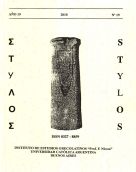Please use this identifier to cite or link to this item:
https://repositorio.uca.edu.ar/handle/123456789/4767| Título: | Categorías identitarias en el Corpus de Cromacio de Aquileia : reflexiones en torno a su naturaleza y finalidad | Autor: | Noce, Esteban | Palabras clave: | Cromacio de Aquileya, Santo, ca 340-ca.408; LITERATURA ANTIGUA; JUDAISMO; PAGANISMO; CRISTIANISMO; HEREJIAS; LITERATURA RELIGIOSA | Fecha de publicación: | 2010 | Editorial: | Universidad Católica Argentina. Facultad de Filosofía y Letras. Instituto de estudios grecolatinos "Prof. F. Nóvoa" | Cita: | Noce, Esteban. “Categorías identitarias en el Corpus de Cromacio de Aquileia : reflexiones en torno a su naturaleza y finalidad” [en línea]. Stylos, 19 (2010). Disponible en: https://repositorio.uca.edu.ar/handle/123456789/4767 | Resumen: | Resumen: Son escasos y tangenciales los estudios dedicados al análisis de los colectivos socio-religiosos -Iudaei, gentiles y haeretici- en el corpus cromaciano, pese a la importancia cuantitativa que en él asumen. Al respecto, predominan dos tesituras: por un lado, aquella según la cual las invectivas contra ellos lanzadas por el obispo de Aquileia no serían más que meros topoi de la literatura cristiana tardoantigua; por otro, aquella que las considera reacciones ante situaciones de hecho. Por nuestra parte, a partir de la lectura del corpus cromaciano, sostendremos que, tal como los presenta Cromacio de Aquileia, el significado de los colectivos identitarios antedichos no debe buscarse en su carácter tipológico ni en situaciones presentes que ameritaran la sanción episcopal. Creemos, en cambio, que en un período signado por la permeabilidad religiosa, el permanente recurso a tales colectivos identitarios así como a la reiteración de la pena a ellos correspondiente, la muerte eterna, tendría por objetivo proyectar sobre el auditorio un cosmos social simplificado que permitiera al oyente identificarse como parte de los catholici o de los homines impii. De tal modo, se esperaría que el individuo ajustara su conducta a los parámetros de ortodoxia recientemente sancionados, facilitando así la construcción de los christiana tempora en el plano del cotidiano. Abstract: There are little and tangential studies dedicated to the analysis of the socio-religious groups -Iudaei, gentHe and haeretici- in the cromacian corpus, in spite of the quantitative importance in it assumed. Regarding this, there are two predominant attitudes: on one hand, the attitude according to which the invectives sent against them by the bishop of Aquileia would not be more than mere topoi of late-antique christian literature; on the other hand, the one that considers reactions in the presence of fact situations. From our side, taking as reference the cromacian corpus, we support that, as presented by Cromace of Aquileia, the meaning of the aforesaid identitary groups doesn't have to be sought in its typological character nor in present situations deserving the episcopal sanction. We believe, in fact, that in a period signed by a religious permeability, the permanent resort to such identitary groups as well as the reiteration of the corresponding penalty to them, the eternal death, would have had by objective to project to the audience a simplified social cosmos that would allow the listener to identify himself part either of the catholici or of the homines impii. For this reason, it would be expected that the individual fit its conduct to the orthodoxy parameters recently sanctioned, facilitating therefore the construction of the christiana tempora in the daily level. |
URI: | https://repositorio.uca.edu.ar/handle/123456789/4767 | ISSN: | 0327-8859 | Disciplina: | LITERATURA | Derechos: | Acceso Abierto | Fuente: | Stylos Nº 19, 2010 |
| Appears in Collections: | STY - 2010 nro. 19 |
Files in This Item:
| File | Description | Size | Format | |
|---|---|---|---|---|
| categorias-identitarias-corpus-cromacio.pdf | 712,28 kB | Adobe PDF |  View/Open |
Page view(s)
89
checked on Apr 30, 2024
Download(s)
67
checked on Apr 30, 2024
Google ScholarTM
Check
This item is licensed under a Creative Commons License

